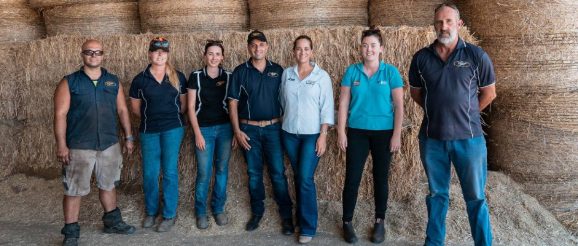Innovation pays off for Donnybrook feedlot | Farm Weekly | Western Australia

WITH few Western Australian feedlotters in 2009, it was a risk for Paradise Beef owner Gary Dimasi to start his operation.
But it paid off this year, when the Donnybrook-based feedlot was named the 2021 Australian Lot Feeder of the Year in the under 3000-head category.
Hosted by the Australian Lot Feeders’ Association (ALFA), the competition was set out over a 12-month judging process to uncover Australia’s best National Feedlot Accreditation Scheme (NFAS) accredited feedlots.
“We had a crazy dream and look where we are today,” Mr Dimasi said.
“With innovative ideas and continued growth it has been a good thing for our business and that’s why we won the award.”
A standout of Paradise Beef’s innovative ideas has been a custom made 185 metre long, 15m wide, sheltered, dome-shaped feedlot that can hold up to 600 head of cattle across six pens.
It was built in 2016 to keep cattle cool in summer and warm in winter given the farm is in a high rainfall area of about 900 millimetres annually.
“This has seen our winter average daily gain performance increase by up to 25 per cent,” Mr Dimasi said.
“We are always looking at ways to minimise our environmental impact and enhance sustainability by working with industry experts to manage effluent and waste.”
Mr Dimasi said they developed their own bio-mineral fertiliser with trace minerals and microbes to help their clients.
“We ensure our effluent irrigated pastures for backgrounding are balanced by monitoring soil tests and managing key nutrients such as phosphorus and we utilise gear driven irrigation sprinklers that stimulate biology before paddock application,” he said.
Mr Dimasi said his operation also worked with a microbiologist to look at the effects of beneficial microbe applications in pens to mitigate air emissions for improved air quality outcomes.
Paradise Beef custom feeds about 70pc of its cattle for clients for domestic and international markets.
The feedlot covers pen management, feed ration management, days on feed, stock inventory and feed costing overview.
“We provide full traceability from induction to load out, assisting to assure we meet NFAS requirements to suit our market’s quality standards,” Mr Dimasi said.
“We feed between 8000 and 10,000 cattle per year on close to three hectares.
“We utilise effluent irrigated paddocks for backgrounding cattle.”
Another project, which Paradise Beef has commenced working on, is an application to manage feedlot traceability from stock inventories, to cattle in and out.
Stage one was completed earlier this year and involved identification of cattle and showing what cattle are in every pen, nutrition rations, what each animal eats and the costs for those cattle.
The second stage is currently being built and will give a full costing and traceability of the cattle and what they eat – all the way through to the abattoir.
The third – and final stage – is set to include a full costing for international clients, who do their own custom kills.
It will provide them with the costs of processed meat in a box.
The application could be available in coming months, given the success of the trials.
“Input from employees was used in the design of the app,” Mr Dimasi said.
“One of my older employees said, “nope, I don’t like it” and now he thinks it is one of the best tools, as it helps him with feed carts and management of the feed and pens.
“The app is live, anyone can look at it on their phone and see exactly what is going on.
“They can change rations accordingly and see what is happening in the feedlot, no matter where they are in Western Australia or Australia.”
The winners in each size category were announced at ALFA’s virtual Awards Ceremony tonight, attended by lot feeders and guests around the country.
The pillars of the competition relate to the five core NFAS principals, including a feedlot’s quality assurance culture, product integrity, environmental responsibility, animal welfare responsibility and business planning.
Areas explored by the independent judging panel included innovation, employer of choice, chain of responsibility and community amenity and social accountability, which helped to set apart top performing feedlots.
From an initial entry pool of 35 feedlots across the nation, nine finalists vied for the top position of Australian Feedlot of the Year across four size categories including under 3000 head, 3000-8000 head, 8000-15,000 head and above 15,000 head.
The judges said Paradise Beef aimed to be a community leader.
“They make a positive contribution to the feedlot industry by employing passionate people and providing them with opportunities to reach their full potential and goals,” the judges said.
“They inspire their team to always think outside of the box on ways they can improve animal welfare, and how they can enhance the quality of the beef we produce and ensure a safe fulfilling workplace.
“They also encourage and support our staff to participate in further training to develop their careers.
“Paradise Beef’s team strives to provide customers with high quality, innovative service and a premium product and they attribute their success from working as a team – as one.”
ALFA president Bryce Camm said the award showcased the pinnacle the feedlot industry had to offer.
“All finalists in the competition this year should be commended for their efforts in striving to push the status quo and be the best they can be,” Mr Camm said.
“The winning feedlots are a proud reflection of the lot feeding sector’s strong commitment to operating within robust quality management systems, continual improvement and innovation.”
Want weekly news highlights delivered to your inbox? Sign up to the Farm Weekly newsletter.
